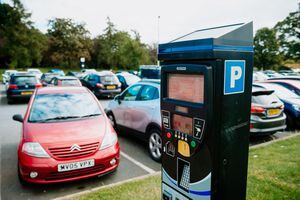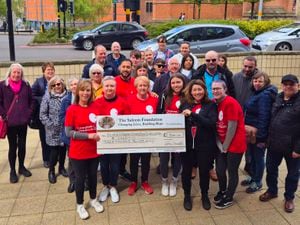One in three English hospitals increased parking charges last year
One in three hospitals in England put up the cost of parking last year, with patients and visitors objecting to the "exorbitant" prices, an investigation has found.

The study showed hospitals across the country made more than £254 million from parking in 2018/19, as patients and visitors said they felt ripped off.
For the investigation carried out by the Press Association, 7,883 patients and visitors – who had used a hospital car park in the last two years – were surveyed, and financial data gathered from 144 NHS trusts.
The data showed hospitals made £254,373,068 from charging for parking in 2018/19, up 10 per cent on the previous year – a record high.
Overall, 47 NHS trusts increased their charges between 2017/18 and 2018/19, typically by 10 per cent.
The local figures
Across the Black Country and Staffordshire, hospitals raked in more than £11.4m from parking charges during 2018/19.
The Royal Wolverhampton NHS Trust, which runs New Cross and Cannock Chase hospitals, received £2.6m from parking charges, while Sandwell and West Birmingham NHS Trust, which runs Sandwell General and Birmingham City hospitals, made £2.4m.
Walsall Healthcare NHS Trust, which runs Walsall Manor Hospital and Dudley Group NHS Foundation Trust – including Russells Hall Hospital – made £1.5m each.
The figure was £3.4m at the University Hospitals of North Midlands NHS Trust, which runs County Hospital in Stafford as well as Royal Stoke Hospital.
Of the total figure, £8.3m was paid by patients and visitors coming to see loved ones. It costs around £5 on average to park for four hours at West Midlands hospitals.
Sandwell and West Birmingham Hospitals NHS Trust, Dudley Group NHS Foundation Trust, Walsall Healthcare NHS Trust, The Royal Wolverhampton NHS Trust and the University Hospitals of North Midlands NHS Trust have not increased parking charges between 2017/18 and 2018/19.
Stress
The survey revealed that nationally patients and visitors often struggled to find spaces, experienced a lack of disabled parking, long queues and parking meters that did not work.
Overall, 86 per cent of those polled said parking added to the stress of a hospital visit.
One patient, who wished to remain anonymous, said: "The car parks are so busy that from 4.30pm until 5.30pm it can take nearly one hour to leave the hospital."
Another said he had spent more than £100 visiting his wife.
Others described the charges as "a rip-off", "too expensive", "extortionate", "astronomical" and "exorbitant".
As part of their election manifesto pledges, Labour has vowed to scrap all hospital parking charges, while the Conservatives say parking will be free for those in greatest need, including the disabled, parents of sick children staying overnight, staff working night shifts and those regularly needing outpatients.
Split on payment
As part of the PA investigation, 49 per cent said no-one should have to pay for parking at hospitals and 46 per cent thought visitors should.
Some 12 per cent believed patients should pay and eight per cent thought hospital staff should charged.
Half of those who thought someone else should foot the bill said the Government should pay, while 23 per cent thought NHS trusts should be responsible.
When it came to problems with parking, 32 per cent said they struggled to find a space during their visit.
One in 10 could not find disabled parking, 10 per cent were confused by parking rules and 11 per cent could not pay in the way they wanted to.
Almost one in five who received a parking fine said it was because their appointment overran or for "some other reason beyond their control".
Many also complained about the charges and the queues to find a space.
Comments included, "I had to queue for 40 minutes to get into the car park", "I had to wait too long for space and was late for appointment" and "difficult to estimate how long is needed. Cost is ridiculously high and length of time needed can be very varied depending on whether the department is running to time".
National outlook
Overall, 126 NHS trusts provided data to PA following a Freedom of Information (FOI) request.
Data for an extra 18 trusts was collected from figures submitted to NHS Digital as part of their annual estates and returns information collection.
Manchester University NHS Foundation Trust took the most parking revenue in 2018/19 at £6,352,676, up on the £6,285,340 the previous year.
That was followed by University Hospitals Birmingham NHS Foundation Trust (£5,876,000) and University Hospitals Of Leicester NHS Trust (£5,025,860).
Overall, trusts took £254,373,068 in 2018/19, including at least £142,958,247 from patients and visitors, and £65,219,879 from staff.
That was up 10 per cent on the £232,236,216 the year before, which included at least £124,864,444 from patients and visitors and £60,060,676 from staff.
Income from parking fines increased eight per cent in 2018/19 to £1,557,749, despite fewer trusts disclosing their income than the previous year.
Just under half (65 out of 124) of trusts said their car parks were managed by a private company, with at least 23 of these private firms taking all the fines income.
Half of trusts charged for disabled parking.
Only England's hospitals routinely charge for parking, as car parks are largely free in Scotland, Wales and Northern Ireland.
Frustrating
A spokeswoman for the Patients Association said: "Charges for car parking at hospitals are a charge on people who are unwell, levied on them because they are unwell.
"We believe patients should not be effectively charged for being ill.
"Practical arrangements to prevent car parks being used by other motorists can and should be installed, as they are at supermarkets, hotels and so on."
Deputy chief executive of NHS Providers Saffron Cordery said increases in the cost of parking were frustrating, but added: "Car parks are expensive to run for the trusts that own them.
"These parking facilities must be maintained, lit well, and secure. Parking facilities must also provide good access for patients, families and staff.
"All charges by trusts for parking cover the day-to-day running of car parking at the hospital, with any surplus reinvested back into wider services for patients or improving these facilities."
She said abolishing charges could cost around £200m per year, and trusts would have to find funding from elsewhere, which could "impact on patient care".





